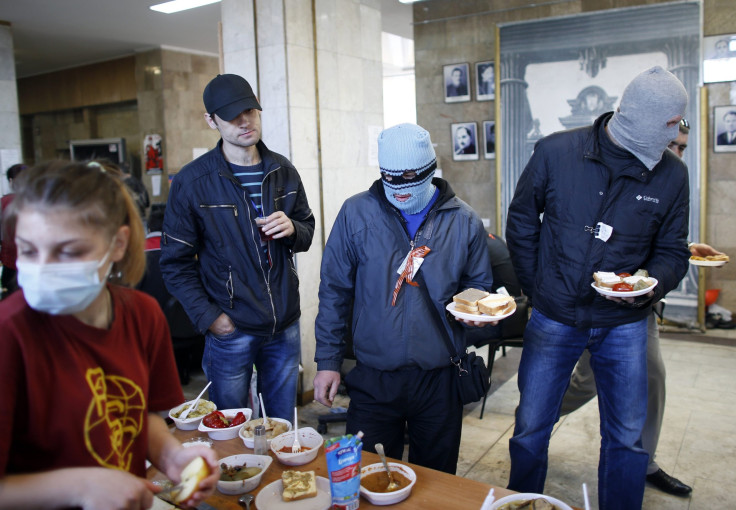After Geneva Agreement In Ukraine Crisis, Pro-Russian Activists Aren’t Going Anywhere

A day after one of the deadliest clashes between pro-Russian activists and Ukrainian security forces in the eastern Ukrainian city of Mariupol and an initial agreement among Russia, Ukraine and the West to resolve the crisis, pro-Russian separatists are refusing to lay down their arms and leave the public buildings they seized.
Denis Pushilin, leader of the self-proclaimed Donetsk People's Republic, told reporters that the current Ukrainian government in Kiev is not legitimate and that insurgents will not vacate the government buildings they occupy in more than 10 cities until the interim government resigns.
Pushilin said Russian Foreign Minister Sergei Lavrov, meeting in Geneva with U.S. Secretary of State John Kerry and European diplomats, "did not sign anything for us, he signed on behalf of the Russian Federation." He repeated demands for a referendum for the Donetsk region by May 11, similar to the one held in Crimea in March in which the Ukrainian autonomous region voted to join Russia.
The agreement among the United States, Russia, Ukraine and the European Union in Geneva on Thursday was the first diplomatic step to solving the crisis in Ukraine, where separatists are pushing Russian-speaking parts of the country either to become part of a newly federalized Ukraine or to join Russia.
Under the deal, illegal armed groups must disarm and return seized property and vacate public places like streets and squares. Amnesty will be granted to pro-Russian protesters who participated in the uprisings, except for those found guilty of capital crimes, the agreement stated.
With deep mistrust between pro-Russian separatists and the Western-supported Kiev government, the agreement may be difficult to enact on the ground. In addition to armed separatists, out-of-uniform Russian soldiers may also be in the area -- a move Russian President Vladimir Putin previously made during the Crimea conflict.
Eugene R. Fidell, who teaches at Yale Law School, says he believes Putin is pulling the same moves he did last month when troops in unmarked uniforms helped annex Ukraine's Crimean Peninsula.
“I don’t think a leopard changes its spots,” Fidell told International Business Times Friday.
If this proves to be the case, Fidell affirms this would be an “act of hostility” on Russia’s part and further the idea that the Russian government will continue to “take bites” out of Ukrainian territory despite the Geneva agreement.
News correspondents in the affected cities say little has changed since the deal was drafted on Thursday.
"Are we going to leave the buildings so that they can come and arrest us? I don't think so," a man calling himself Alexei told Sky News as he guarded a seized security office in Slavyansk.
Photos on Twitter show separatist-occupied buildings in Slavyansk barricaded with sandbags.
Barricades et militants pro-russes armés toujours en place à Sloviansk, #Ukraine @RadioCanadaInfo pic.twitter.com/Bwm6F62RwL
— J-Francois Belanger (@belangerjf) April 18, 2014Loin de démanteler leurs barricades, ces miliciens pro-russes à Sloviansk, #Ukraine les renforcent. @RadioCanadaInfo pic.twitter.com/bZn6owNN1I
— J-Francois Belanger (@belangerjf) April 18, 2014Pro Russia seps occupying Donetsk gov say they will leave when "illegal junta" in Kiev steps down - so ain't over pic.twitter.com/NRJ1ePN7e4
— William Booth (@BoothWilliam) April 18, 2014In Kiev, acting President Oleksander Turchinov and Prime Minister Arseny Yatseniuk said in a joint televised address Friday that they support constitutional changes that will preserve national unity such as strengthening Russian language rights and decentralizing more power to local councils.
Yatsenyuk also told parliament that a law should be drafted that offers amnesty for those who surrender their arms and leave occupied government buildings.
At another press conference in Kiev, the Security Service of Ukraine said it was increasing security operations in Kkarkiv, a city in northeastern Ukraine close to the Russian border, by inspecting more vehicles for weapons, ammunition and explosives. The agency says it will continue to detain people entering the country carrying large amounts of cash and military equipment.
The true test will be whether Russia, which does not recognize the current Kiev government, will take action to see the terms of the agreement are met.
"I don't know the Russian intentions, but Minister Lavrov did promise that they want to de-escalate, so we will see in a few days if it was (a) sincere promise and sincere participation," acting Ukrainian Foreign Minister Andriy Deshchytsia said.
While both sides agreed to oversight from the Organization for Security and Cooperation in Europe, the continuing tension between the pro-Russian groups and Ukrainian security forces may be a major hurdle to restoring peace in the region.
In Washington, President Barack Obama expressed skepticism about Russia honoring the pact, and said the United States is prepared to impose more sanctions if necessary. "I think there is the possibility, the prospect, that diplomacy may de-escalate the situation," he said during a press conference Thursday.
© Copyright IBTimes 2024. All rights reserved.






















